Deer can eat hay, especially when other food sources are scarce. However, hay is not their preferred food choice.
For many living in rural or semi-rural areas, the question of whether deer feed on hay is a common concern. These adaptable animals often graze on a variety of vegetation, with preferences leaning towards fresh, green plants found in their natural habitats.
During the winter months or in conditions where food is less abundant, deer may turn to hay as a supplementary source of sustenance. It is important to consider the quality and type of hay offered, as some may not provide the necessary nutrients and could even be detrimental to deer health if not specifically formulated for their digestive systems. Knowing this, landowners and wildlife enthusiasts look to strike a balance between supporting the dietary needs of deer and promoting an environment that supplies more natural, preferred forage.

Credit: www.floretflowers.com
Deer Diets Decoded
Welcome to “Deer Diets Decoded”, where we unravel the mysteries of what deer eat. Understanding a deer’s diet is crucial for wildlife enthusiasts, gardeners, and farmers. Let’s dive into the diverse palette of the deer and their nutritional needs. Whether it’s a simple question like, “Will deer eat hay?” or a more complex one regarding their dietary preferences, we have the answers.
Variety In The Deer Palate
Deer are not just creatures of habit; they’re opportunistic feeders with a wide taste range. Their diets shift with the seasons, availability, and location. Here’s what typically finds its way onto a deer’s menu:
- Spring and Summer: Fresh green plants, leaves, and buds.
- Fall: Acorns, nuts, and fruits, preparing for winter.
- Winter: Woody plants, evergreens, and yes, even hay.
The availability of these foods dictates whether or not a deer will turn to alternative options like hay.
Nutritional Needs Of Deer
Deer require a balanced diet rich in carbohydrates, proteins, and fats. Vital for their growth and survival are also vitamins and minerals. Here’s what their nutritional intake encompasses:
| Component | Importance |
|---|---|
| Proteins | Builds body tissue, especially vital in spring and summer. |
| Fats | Stores energy for the cold winter months. |
| Carbohydrates | Immediate energy source, crucial throughout the year. |
| Vitamins/Minerals | Supports overall health and bone growth. |
Deer also seek out plants with sodium to supplement their diet. To maintain their health, they require constant access to clean water sources.
In conclusion, while deer may turn to hay as a dietary option, particularly in the scarcity of winter, their dietary habits are complex. They continuously adapt to their environment to meet their nutritional needs.
Hay: An Unlikely Choice?
Hunting for food, deer often surprise us with their dietary choices. Hay might appear as an unlikely option for these nimble creatures. Yet, conditions and surroundings guide their munching habits.
The Role Of Hay In Agriculture
Typically used as livestock fodder, hay is crucial in farming. Comprising mainly of grass, legumes, or other herbaceous plants, it’s stored for use in colder months. Let’s delve deeper:
- Longevity: Properly dried and stored, hay remains edible for animals over time.
- Variety: Different plants like alfalfa, clover, and timothy offer diverse nutrition.
- Economy: Hay provides a cost-effective feeding solution for many farmers.
Deer’s Natural Foraging Behavior
Deer show a strong preference for fresh, natural vegetation found in their habitats. They mainly consume:
- Tree foliage: Young shoots and leaves are a favorite.
- Shrubs: These provide both cover and nourishment.
- Grasses: Deer eat grass, but it’s not their first choice.
In winter or scarce times, deer might turn to hay as a source of sustenance. The availability and type of hay can influence their decision. If fresh forage is sparse, hay might become a temporary food source.
Factors Influencing Deer Feeding Habits
Factors Influencing Deer Feeding Habits play a crucial role in the diet of these adaptable animals. Deer’s preferences may shift noticeably. Understanding these influences is key for wildlife enthusiasts, gardeners, and land managers alike.
Seasonal Availability Of Food
Summer and spring bring abundant food, with deer favoring tender greens and shoots. As fall approaches, nuts and fruits become their top picks, providing energy for winter. Winter scarcity often drives deer to seek alternative sources, such as hay, when their usual diet becomes hard to find.
Human Interaction And Deer Behavior
Deer adapt to human presence and landscapes. Areas with high human activity may push deer to change their natural foraging habits, including risking a taste of hay from nearby farms. Landscape changes, like deforestation, can also impact the availability of their natural foods, making hay a potential option in their varied diet.

Credit: www.ntxe-news.com
Gardeners’ Guide To Deer-proofing
When it comes to garden maintenance, protecting plants from deer is a top concern for many gardeners. Deer can be persistent, often finding their way into gardens in search of food like hay. This guide provides practical steps to help you keep these gentle but hungry creatures at bay.
Effective Fencing Techniques
Fencing is the most reliable method to prevent deer from entering your garden. A solid fence should stand at least 8 feet tall, as deer are excellent jumpers. Consider the following fencing solutions:
- Privacy Fences: Blocks the view and access for deer.
- Wire Fences: These should be tall and angled away to discourage jumping.
- Electric Fences: A gentle shock can deter deer without causing harm.
Deer Deterrents And Repellents
Beyond fencing, other methods can discourage deer. These include:
| Deer Deterrents | How They Work |
|---|---|
| Noise Makers | Alarms or wind chimes can scare deer off. |
| Motion-Activated Sprinklers | Unexpected water can startle and repel deer. |
For repellents, try these:
- Commercial Repellents: Spray on plants to make them taste bad to deer.
- Natural Options: Use soap, human hair, or predator urine to create a scent barrier.
Alternative Food Sources For Deer
Finding the right food for deer can sometimes feel like a puzzle. When the winter comes, or natural food sources are scarce, hay might seem like a good option, but there’s much more deer can eat. Let’s explore alternative food sources that can keep deer healthy and satisfied.
Cultivating Deer-friendly Zones
A deer-friendly zone is an area where deer can find ample food naturally. Native plants, shrubs, and trees can provide year-round nutrition.
- Fruit trees such as apple or pear.
- Nut trees like oak or hickory.
- Shrubs that produce berries.
Remember to plant diverse species to ensure food is available in all seasons.
Supplemental Feeding: Pros And Cons
Supplemental feeding is giving deer extra food. This can help them during hard times.
| Pros | Cons |
|---|---|
| Supports during scarcity | Can cause dependency |
| Improves health and survival rates | Might lead to overpopulation |
| Aids fawns in growth | Possible spread of disease |
Whether to provide supplemental feed is a decision that requires careful consideration of these pros and cons. Always consult local wildlife experts to make the best choice for your area.

Credit: www.discountmags.com
Frequently Asked Questions For Will Deer Eat Hay
Do Deer Include Hay In Their Diet?
Hay is not a natural food for deer, but they may consume it if their preferred forage is scarce. They typically prefer fresh greens like leaves, shoots, and grasses.
Is Hay Beneficial For Wild Deer?
Hay provides minimal nutrition for deer compared to their natural diet. It may act as a filler food but lacks the proper balance of nutrients wild deer require.
Can Feeding Hay To Deer Cause Health Issues?
Yes, feeding hay to deer can lead to digestive problems. Deer have complex stomachs designed for leafy material, and hay can cause impaction and fermentation issues.
What Types Of Hay Might Deer Eat If Available?
If deer do eat hay, they might prefer types with a mix of clover or alfalfa, which are closer to their natural diet than plain grass hays.
Conclusion
Wrapping up our discussion on deer and hay feeding, it’s clear that while hay isn’t their preferred choice, deer may resort to it in tough times. Gardeners should consider this when planning their feeding strategies, especially during harsh winters. Offering alternative forage could steer deer away from hay and maintain a balanced diet for these graceful creatures.


